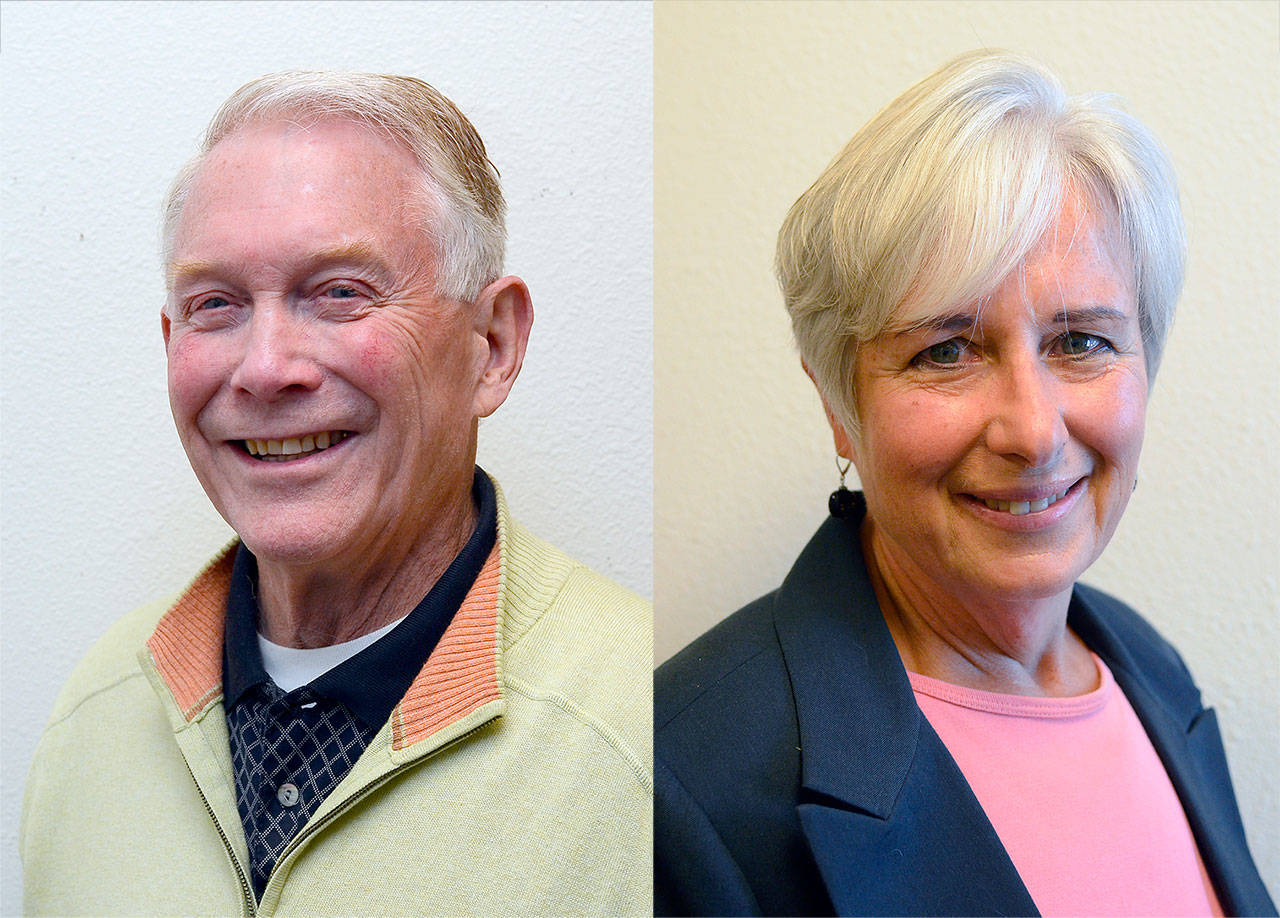Two Langley residents with different takes on the city’s needs are running for position 2 on the city council.
Vying for the seat are incumbent Dominique Emerson, who was appointed to the council in January 2016, and challenger Bill Nesbeitt.
Nesbeitt, 78, is a former Army officer who has lived in Langley for three years following a 30-year career in executive positions for various companies, including an industrial biology tech firm and waste water irrigation firm. The West Point graduate became involved in the arts not long after arriving in Langley and became a board member for Whidbey Island Center for the Arts.
He says he’s running for the council at the behest of his friends in town and feels he can bring more to the table than his opponent. His main focuses are protecting and preserving the city and its citizens, being involved “in a good, sensible government” and supporting small businesses.
“We don’t want big box stores, we don’t want chain stores, we don’t want the kind of stuff that you see in every city you drive through in America today,” Nesbeitt said. “We’d like to have something unique and special. But, we need to have a small business community that is good for the people so they don’t have to get on a ferry or drive a long distance across a bridge, then drive a long distance to get somewhere. We need good drug stores, good hardware stores, good restaurants.”
Nesbeitt felt the city spent an “inordinately” large amount of money during the six-month-long sanctuary city discussion.
He said there was no dispute over the need for an inclusive resolution, but felt an ordinance was unnecessary and that the prolonged discussion ultimately cost the city more than it gained.
“That’s an example of what I think is bad city government management,” Nesbeitt said. “We spent a lot of money that didn’t need to be spent. That money could have paid for other things that are needed.”
Nesbeitt sees the role of a city council member as being someone who listens, finds compromises, takes care of the people and provides oversight without stepping on the toes of city staff.
“A city council has to walk down a tight rope,” Nesbeitt said. “I’ve watched this for 48 years. What they do has to be good for the community right now and in the future, and sometimes that’s a tough decision and even tougher to understand.”
Emerson, 68, is running so she can continue helping people understand the inner workings of what the city council is doing. Emerson currently serves as the council’s liaison for the Port of South Whidbey, while she is also co-chairwoman of the Fairgrounds Advisory Committee. Before she was a councilwoman, Emerson was chairwoman of the Planning Advisory Board, president of the Whidbey Animals’ Improvement Foundation (WAIF), president of the Whidbey Island Garden Tour, president of the Langley Library and was also a board member for WICA and the Northwest Horticultural Society.
Emerson said she’s gained a “very good” understanding of the city’s comprehensive plan, which serves as a road map for Langley’s future, over the past year and a half. Her campaign platform has several major points of emphasis that stem from the comprehensive plan: Creating more affordable housing, improving the city’s aging infrastructure, preserving Langley’s “village” atmosphere and creating economic diversity.
“All of these small towns go through these boom and bust cycles, and how well you address these will help alleviate the low,” Emerson said. “If you have economic diversity and you have the right kind of housing and the diversity of your population, you can weather an economic downturn. So, it helps even things out. And, you need the infrastructure to support it.”
Improving sewer and stormwater are her top priorities regarding infrastructure, while improving sidewalks, mobility and better trails are also on her radar.
Emerson said she has a few accomplishments under her belt that mark her successes as a city councilwoman, including helping draft an inclusive city resolution that was passed in March 2017, developing the Shoreline Management Plan, expanding sidewalks and establishing funding for parks, trails and open spaces and the arts.
Another issue important to Emerson is housing rezoning. She believes there needs to be strong discussion surrounding proposals to densify the downtown core, which includes allowing two accessory dwelling units (ADU) per property, downsizing minimum lot size, increasing lot coverage, reducing parking requirements to allow for multiplexes, duplexes, triplexes and fourplexes.
“I think all of these are going to have a very significant impact in a lot of ways,” Emerson said. “Not just in the parking pressures and the land coverage and permeability, but just in the noise level and feel of the town.”
She said she’s still on the fence regarding the proposals and would rather see “large tracks of land” near Upper Langley be rezoned and developed.
“We’re only one square mile,” Emerson said. “Why are we focusing so tightly on concentrating that increased development within the Sixth Street area. Look at how successful Upper Langley is.”
Both candidates were asked whether or not they support President Donald Trump. Emerson does not, while Nesbeitt said he respects the office of the president “regardless” of who sits in it, though he added he’s seen both “good and bad with Donald Trump.”



